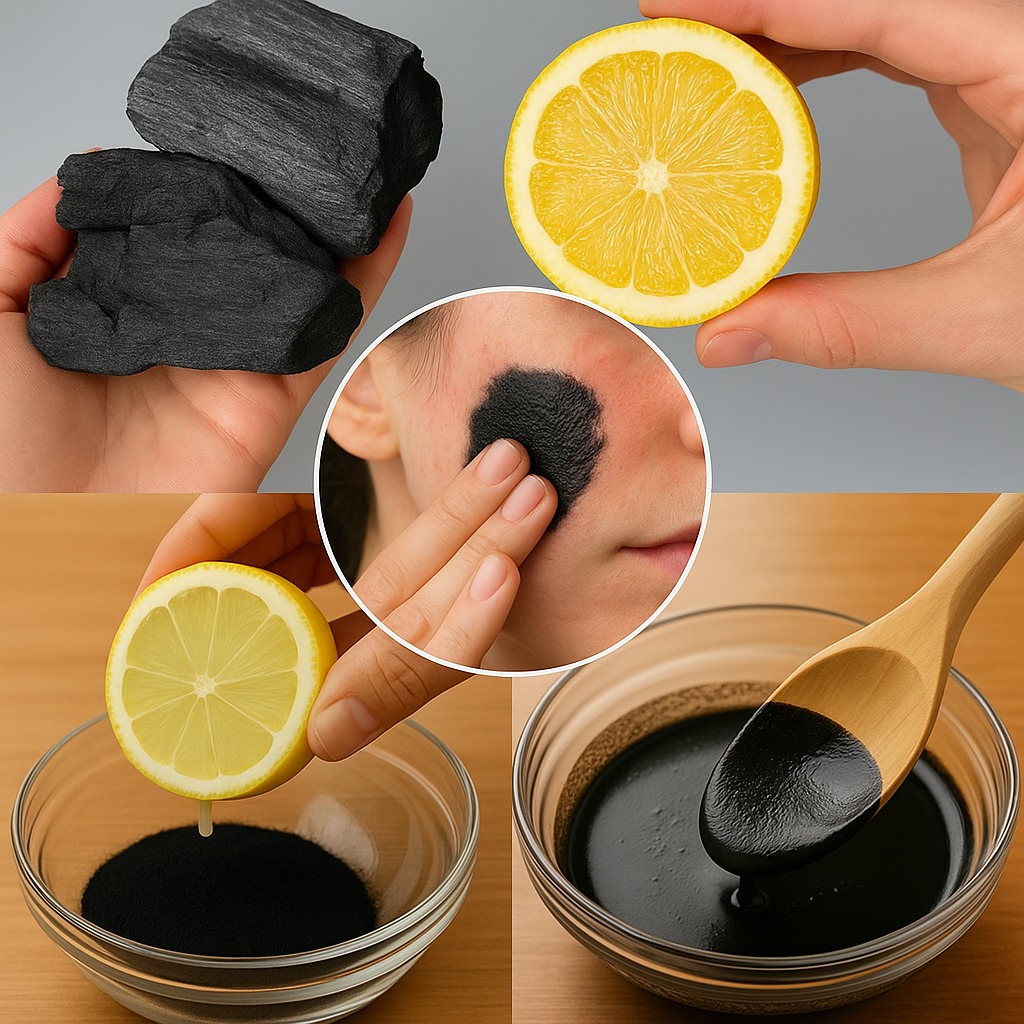
Incorporating lemon and charcoal into your skincare is simple, but safety is key to avoid irritation or sensitivity. Here are practical ways to use them at home:
- Lemon and Charcoal Face Mask: Mix 1 tablespoon of activated charcoal powder with 1 teaspoon of fresh lemon juice and a bit of honey for hydration. Apply to clean skin for 10 minutes, then rinse with warm water. Use once a week to avoid over-exfoliation.
- Brightening Toner: Dilute 1 part lemon juice with 4 parts water to create a gentle toner. Dab onto skin with a cotton pad to reduce dark spots, avoiding the eye area.
- Charcoal Scrub: Combine activated charcoal with a mild exfoliant like oatmeal and water for a gentle scrub to unclog pores. Massage lightly and rinse thoroughly.
- Spot Treatment: Dab diluted lemon juice on dark spots or acne scars at night to minimize photosensitivity, followed by a moisturizer to lock in hydration.
Safety Tips routine:
- Always dilute lemon juice to prevent irritation or photosensitivity, which can lead to sunburn.
- Test any mixture on a small patch of skin to check for allergic reactions.
- Avoid using lemon on broken or irritated skin, as it may sting or worsen sensitivity.
- Use sunscreen after lemon-based treatments, as citric acid can make skin more sun-sensitive.
- Choose food-grade or cosmetic-grade activated charcoal from reputable sources to ensure purity.
By following these guidelines, you can enjoy the benefits of lemon and charcoal while keeping your skin safe.
Benefits for Common Skin Concerns

Lemon and charcoal address a range of skin issues, making them versatile additions to your routine. Here’s how they can help:
- Oily Skin and Acne: Charcoal’s ability to absorb excess oil and impurities helps reduce shine and prevent breakouts, while lemon’s antibacterial properties may target acne-causing bacteria.
- Dark Spots and Hyperpigmentation: Lemon’s vitamin C and citric acid can fade dark spots over time, as supported by a 2023 study on topical vitamin C.
- Dull Complexion: Lemon’s exfoliating properties remove dead skin, revealing a brighter complexion, while charcoal deep-cleanses for a refreshed look.
- Pore Appearance: Charcoal minimizes the appearance of enlarged pores by clearing debris, giving skin a smoother texture.
For best results, use these treatments 1–2 times per week and pair with a consistent skincare routine, including cleansing, moisturizing, and sun protection. Share this with a friend who loves affordable skincare hacks!
DIY Lemon and Charcoal Recipes for Glowing Skin

Creating your own lemon and charcoal skincare products is budget-friendly and fun. Here are two easy recipes to try at home:
- Hydrating Lemon-Charcoal Mask:
- Ingredients: 1 tbsp activated charcoal, 1 tsp fresh lemon juice, 1 tbsp honey, 1 tsp aloe vera gel.
- Instructions: Mix ingredients into a smooth paste. Apply to clean skin, leave for 10–12 minutes, and rinse with lukewarm water. Moisturize afterward.
- Benefits: Cleanses pores, brightens skin, and soothes irritation.
- Exfoliating Charcoal-Lemon Scrub:
- Ingredients: 1 tbsp activated charcoal, 1 tsp lemon zest (not juice, to reduce irritation), 2 tbsp finely ground oatmeal, 1 tbsp water.
- Instructions: Combine into a gritty paste. Gently massage onto damp skin in circular motions, then rinse. Use once weekly.
- Benefits: Removes dead skin and unclogs pores for a smoother complexion.
Always store homemade mixtures in a clean container and use within a few days to ensure freshness. Explore more DIY skincare recipes on our site for budget-friendly beauty tips!
Precautions and Potential Risks

While lemon and charcoal are natural, they require careful use to avoid adverse effects. Here are key precautions:
-
- Photosensitivity from Lemon: Lemon juice can make skin sensitive to sunlight, increasing burn risk. Always apply lemon-based treatments at night and use sunscreen during the day.
- Irritation Risk: Undiluted lemon juice or overuse of charcoal can dry out or irritate skin, especially for sensitive types. Dilute lemon and limit use to 1–2 times weekly.
- Quality Matters: Low-quality charcoal may contain impurities, reducing effectiveness or causing irritation. Choose activated charcoal labeled for cosmetic or food use.
- Allergies: Some people may be allergic to citrus or charcoal. Discontinue use if redness, itching, or swelling occurs.
- Not for All Skin Types: Those with very dry or sensitive skin should consult a dermatologist, as lemon’s acidity may exacerbate dryness.
By using these ingredients mindfully, you can minimize risks and maximize their skin-loving benefits.

